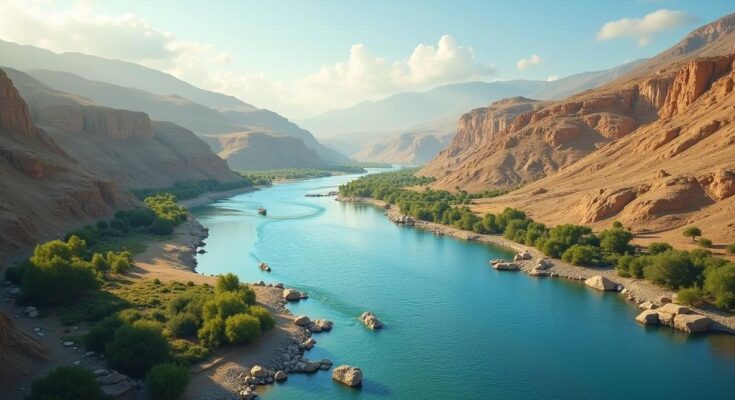Egypt has urged Nile Basin countries to reconsider the Cooperative Framework Agreement (CFA), which governs river management, amid ongoing tensions with Ethiopia regarding the Grand Ethiopian Renaissance Dam. Egypt and Sudan oppose the CFA, while upstream nations have endorsed it. Minister Hani Sewilam emphasized the necessity for discussions inclusive of all nations’ interests, asserting that Egypt will not concede any water rights.
Egypt has urged the countries of the Nile Basin to reevaluate the Cooperative Framework Agreement (CFA), also referred to as the Entebbe Agreement, which establishes principles, rights, and obligations for the management and development of the Nile Basin. Currently, Egypt and Sudan oppose this agreement, while upstream nations—namely Ethiopia, Rwanda, South Sudan, Uganda, Tanzania, and the Democratic Republic of Congo—have signed it. At a recent water event in Cairo, Irrigation Minister Hani Sewilam stated, “We call on the Nile Basin countries that signed the Entebbe Agreement to review their position and return once again to discuss cooperation between countries in a way that does not harm any of the riparian countries.” He underscored that Egypt’s stance is equitable and aligns with international agreements related to river management. Minister Sewilam highlighted the critical situation of Egypt’s water supply, stating, “Egypt will not concede even a single cubic metre of Nile water and firmly rejects the Entebbe Agreement in its current form.” He stressed the necessity for inclusive discussions that consider the interests of all nations involved. President Abdel Fattah Al-Sisi proclaimed that safeguarding Egypt’s water resources is an “existential issue,” underscoring that the Nile River constitutes over 98% of Egypt’s water supply. The CFA represents a significant multi-national attempt by Nile Basin countries to formulate a legal framework for water governance. The Nile has historically been a source of conflict, particularly between Egypt and Ethiopia, particularly due to the latter’s construction of the Grand Ethiopian Renaissance Dam (GERD) on the Blue Nile. Ethiopia asserts that the dam is crucial for its development and does not threaten downstream water supplies. Conversely, Egypt regards the GERD as an existential danger to its Nile water allocation, demanding a enforceable agreement regulating the dam’s filling and operation.
The Cooperative Framework Agreement (CFA) is a pivotal document aimed at fostering cooperation among the Nile Basin nations regarding the utilization and governance of the Nile River. The agreement has been signed by upstream nations but faces opposition from Egypt and Sudan, highlighting the complex interplay of national interests and water resource management in the region. The ongoing disputes, particularly between Egypt and Ethiopia regarding the Grand Ethiopian Renaissance Dam, underscore the heightened tensions that arise from competing developmental needs and water preservation strategies.
In summary, Egypt has called for a reassessment of the Cooperative Framework Agreement by the Nile Basin countries in order to facilitate a cooperative approach to water management. The ongoing tensions surrounding issues such as the Grand Ethiopian Renaissance Dam highlight the critical nature of these discussions, particularly for Egypt, which relies heavily on the Nile River for its water needs. The call for inclusive negotiations reflects Egypt’s stance on maintaining its vital water resources while seeking equitable solutions for all nations involved.
Original Source: www.middleeastmonitor.com




